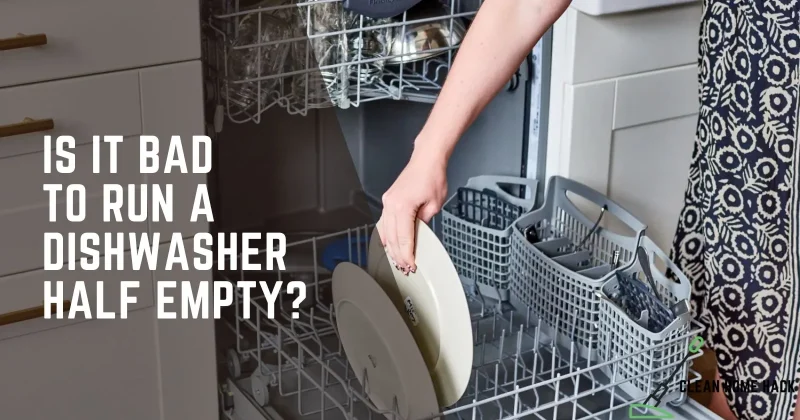Is It Bad to Run a Dishwasher Half Empty?

 The Short Answer is: The Short Answer is: |
| Running a dishwasher half-empty is not necessarily bad for the dishwasher, but it can be considered wasteful and inefficient. It wastes half the energy and water the dishwasher uses. However, running a dishwasher half-full is more efficient than hand-washing those dishes. It is also more wasteful to run your dishwasher every day, even with as few as eight dishes. |
Running a dishwasher half empty is a common dilemma for many people. Some believe that it is wasteful and inefficient, while others argue that it is necessary for their daily routine.
In this article, we will explore the question, “Is it bad to run a dishwasher half empty?” We will also provide tips on how to maximize the efficiency of your dishwasher and maintain its optimal performance.
Table of Contents
The Impact of Dishwasher Load Size
The size of the dishwasher load can have an impact on the efficiency of the dishwasher. A dishwasher uses the same volume of water and electricity to wash a full load as it does when the appliance is only partially filled.
Therefore, it is best to run the dishwasher when it is full to optimize the amount of energy and water it uses in relation to the number of dishes you wash.
The size and capacity of the dishwasher can also affect the run time. A larger dishwasher may take longer as it can hold more dishes.
However, newer technology and smaller load sizes, such as dishwasher drawers, can be ultra-quiet and still accommodate a smaller number of dishes.
In general, households with dishwashers use on average 50% less water and 28% less energy per cleaned item compared to hand washing.
Therefore, using a dishwasher is a more sustainable choice. However, it is important to run full loads only to optimize the efficiency of the dishwasher.
Benefits of Running a Full Dishwasher Load
Running a full dishwasher load has several benefits, including:
1. Energy efficiency: Running a full dishwasher load is more energy-efficient than running a half-empty dishwasher. Running a half-empty dishwasher uses the same amount of energy and water as running a full load, making it wasteful.
2. Water conservation: Running a full dishwasher load helps conserve water. Running a full load optimizes the amount of energy and water used in relation to the number of dishes washed.
3. Cost savings: Running a full dishwasher load can save you money on your water and energy bills. Running a dishwasher on full loads is more efficient and can help reduce water bills.
4. Better cleaning: Running a full dishwasher load ensures that dishes are cleaned more effectively. Running a half-full dishwasher can lead to poor cleaning results as the water and detergent are not distributed evenly.
Running a full dishwasher load is more energy-efficient, conserves water, saves money, and ensures better cleaning results.
Downsides of Running a Half-Empty Dishwasher
Running a half-empty dishwasher may seem like a good idea to save water and energy, but there are some downsides to consider:
1. Wastes water and energy: Running a dishwasher half-empty wastes energy and puts more wear on the machine. It’s more efficient to wait until the dishwasher is full before running it.
2. Uses more detergent: Running a half-empty dishwasher may require the same amount of detergent as a full load, which means you’ll be using more detergent per dish. This can add up to extra costs over time.
3. May not clean dishes properly: If the dishwasher is not full, the water and detergent may not circulate properly, leaving some dishes dirty.
4. Takes up space: Running a half-empty dishwasher takes up valuable space in your kitchen, which could be used for other purposes.
While running a half-empty dishwasher may seem like a good idea, it’s generally more efficient to wait until the dishwasher is full before running it. This will save water, energy, detergent, and space, and ensure that your dishes are properly cleaned.
Energy, Water, and Detergent Consumption
When it comes to running a dishwasher, it is important to consider the energy, water, and detergent consumption. According to a study, the energy, water, and detergent consumption of dishwashers greatly depends on the user’s behavior, especially the way of loading and cleaning.
Therefore, running a dishwasher half empty may not be the most efficient way to use it. Commercial pass-through dishwashers run on single-phase/15 Amp power and can save a lot when it comes to energy, water, and detergent consumption.
To make further reductions in energy, water, and detergent consumption, it is recommended to put a full load into the washing machine.
Dishwashing Tips for Maximum Efficiency
1. Always run full loads: Running a dishwasher with a full load is more efficient than running it half empty. This is because the dishwasher uses the same amount of water and energy to wash a full load as it does for a half load.
2. Choose the right size: Choose a dishwasher that is the right size for your household. A dishwasher that is too small will require more frequent loads, while a dishwasher that is too large will waste water and energy.
3. Skip the pre-rinse: Pre-rinsing dishes is not necessary and wastes water. Scrape leftover food off the plates before putting them into the dishwasher, but do not pre-rinse.
4. Use a high-quality dishwashing detergent and a rinse agent: Using a high-quality detergent and a rinse agent can improve the cleaning ability of your dishwasher. A rinse agent can also prevent water spots and hazy films from remaining on your dishes.
5. Turn down the heat: Use the lowest temperature setting that will effectively clean your dishes. This will save energy and reduce the risk of damaging your dishes.
6. Air dry: Use the air dry setting on your dishwasher instead of the heat dry setting. This will save energy and reduce the risk of damaging your dishes.
7. Clean your dishwasher regularly: Regular maintenance of your dishwasher will ensure years of faithful service and improve its cleaning ability. Clean your dishwasher at least a few times per year.
8. Use energy-saving options: Pay attention to the cycle options on your dishwasher and select the cycle that requires the least amount of energy for the job. Many models now include “eco” cycles designed to minimize energy and water use.
9. Dump the gunk: A dishwasher’s cleaning ability can be compromised if you deposit too much food residue into the system. Scrape leftover food off the plates before putting them into the dishwasher.
Running a dishwasher half empty is not efficient. To maximize efficiency, always run full loads, choose the right size dishwasher, skip the pre-rinse, use a high-quality detergent and a rinse agent, turn down the heat, air dry, clean your dishwasher regularly, use energy-saving options, and dump the gunk.
When It’s Okay to Run a Half-Empty Dishwasher
Running a dishwasher half-empty is not always a bad thing. In fact, there are some situations where it is perfectly acceptable to do so. Here are some instances when it’s okay to run a half-empty dishwasher:
1. When you need clean dishes immediately: If you need clean dishes for a party or a dinner, it’s okay to run a half-empty dishwasher. It’s better to have clean dishes than to wait for the dishwasher to be completely full.
2. When you have delicate dishes: Delicate dishes such as crystal glasses or china plates require gentle cleaning. Running a half-empty dishwasher ensures that these dishes are not jostled around during the wash cycle, which can cause them to break.
3. When you have a small load: If you have a small load of dishes, it’s okay to run a half-empty dishwasher. This saves water and energy, which is good for the environment and your wallet.
4. When you have limited time: If you’re in a hurry and don’t have time to wait for the dishwasher to be completely full, it’s okay to run a half-empty dishwasher. This ensures that you have clean dishes when you need them.
However, it’s important to note that running a half-empty dishwasher on a regular basis can be wasteful and inefficient. It’s best to wait until the dishwasher is completely full before running it to save water and energy.
Frequently Asked Questions Related to the Topic:
Is it better to run a dishwasher full or half full?
It is better to run a dishwasher full rather than half-full. Running a half-full cycle is a waste of water and energy. By making the choice to use an Energy Star–certified dishwasher, you can use 80 percent less water than washing dishes at a running sink. To help prolong the life of your dishwasher, it is important to keep it clean and running smoothly.
Can I run the dishwasher when not full?
Yes, you can run the dishwasher when it is not full. However, it is important to ensure that you are using the appropriate wash cycle for the load size and soil level of the dishes.
It is also recommended to scrape any extra food off the plates before loading and evenly space the dishes with the dirty side facing the center of the dishwasher.
Running the dishwasher when it is not full can help save water and energy compared to washing dishes by hand. However, it is important to note that some items may not be dishwasher safe and should be hand-washed instead.
Is running dishwasher half full bad?
Running a dishwasher half full is generally considered wasteful or inefficient. Doing so wastes half the energy and water the dishwasher would use for a full load. However, it is important to note that dishwashers use less water than washing dishes by hand.
Additionally, the dishwasher’s construction, repairs, recycling, and disposal do require materials, energy, and water, and the machine occupies a significant amount of space in your home. Therefore, it is recommended to run the dishwasher when it is full or close to full to be efficient.
Conclusion on Is It Bad to Run a Dishwasher Half Empty
In conclusion, running a dishwasher half-empty can be considered wasteful and inefficient. However, it won’t be bad for the health of the dishwasher.
Overloading the dishwasher can make it harder for the water and detergent to reach all the dishes, resulting in less effective cleaning. On the other hand, running the dishwasher half-full is actually more efficient than hand-washing those dishes.
While running a dishwasher once a day, every day of the week may not be the best thing for the dishwasher’s longevity. Therefore, it is recommended to only run the dishwasher when it is full to maximize its efficiency and effectiveness.







